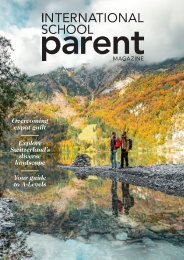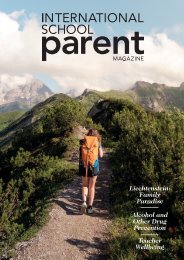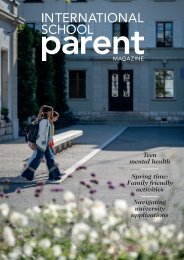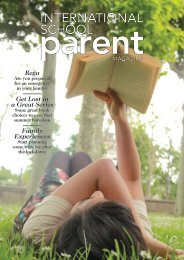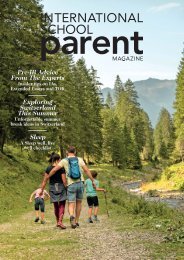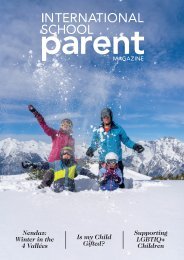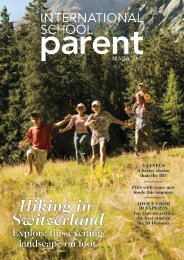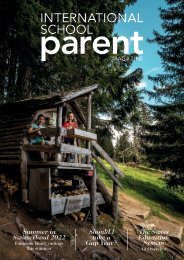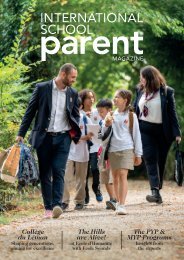International School Parent Magazine - Autumn 2021
International School Parent Magazine - Autumn 2021 Edition. Articles on International Schooling, Education Trends, Parenting, Travel, and more.
International School Parent Magazine - Autumn 2021 Edition. Articles on International Schooling, Education Trends, Parenting, Travel, and more.
Create successful ePaper yourself
Turn your PDF publications into a flip-book with our unique Google optimized e-Paper software.
recording learning becomes essential. Thus,
teaching staff are entrusted with providing
students the tools to self-assess (eg photos,
videos, learning portfolios and apps) that
contribute to a formative and self-directed,
style of assessment. When teacher and
student have evidence before them, they can
constructively discuss how improvement is
going to take place.
What are the Realities of Grading?
It is important to recognize that assessment
is not a secret process of children ‘aiming
for’ achievement and hoping they get
a good score. A school’s student body
– especially a school’s student council
– should fully understand the concepts
outlined here, and the information needs to
be shared with teachers and parents if the
school is to move forward with assessment
capability for students.
A culture of ‘holistic grading’ that
considers a wide range of different criteria
in each subject could then be promoted.
Where these criteria in Math, for
example, might range from ‘Knowing and
“For a child to appreciate their strengths
and weaknesses openly is half the challenge
of education itself.”
Understanding’ to ‘Application in Real-life
Context’, those in Languages and Literature
could include ‘Analysing Language’ and
‘Organising Ideas’.
For a child to understand from where
a grade has originated, and agree with
its rationale, is a key part of building
relationships in learning environments.
Moreover, for a child to appreciate their
strengths and weaknesses openly is half
the challenge of education itself. Teachers
would be ‘grading’ students not just on their
output but their process. The final design
piece, for example, might be impressive, but
more impressive is the journal of progress
they have kept, the constant adjustments
to their approaches they’ve designed, and
the insightful self-commentary they have
developed. Thus, the process would be
graded as much as, if not more so, than the
product.
Ultimately, the best indicator of
knowing if (and to what extent) a child is
learning is in their own ability to reflect
on and answer that question. Through
proactive teaching practice and the use of
technology, educational institutions can
develop mechanisms for collecting evidence
of learning, but that is only part of the
challenge. Teachers, parents, and students
themselves want to see progress – but that
progress is undoubtedly best achieved and
promoted through open discussion and
enabling the child to be the centrepiece of
that process, not merely the recipient of a
grade.
At the Inter-Community School Zurich (ICS), our assessment practices include answering
three important questions for parents: What is my child learning? How do I know my child
is learning? What can I do to support my child’s learning? To arrange an appointment with
our Admissions team, or to find out more about the international school of first choice in
Zurich, visit our website at www.icsz.ch.
INTERNATIONAL SCHOOL PARENT AUTUMN 2021 | 33





